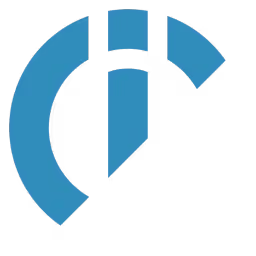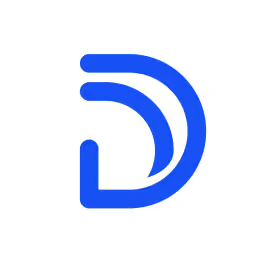Folk Alternatives
Explore 10 alternatives to Folk. This guide provides a direct comparison of features, pricing, and use cases to help you choose your next CRM.

You might be using Folk for its simplicity and clean design. It performs well for basic contact management and is praised for its ease of use. For teams that need a straightforward tool, it gets the job done without much fuss.
But like any tool, it has limits. Some users note missing features, limited customization, and integration issues. We've analyzed the best alternatives based on G2 reviews, comparing their pros and cons to Folk, to help you create a shortlist. Let's get started.
A Note on 11x Digital Sales Workers
For teams that explore digital workers for sales, 11x is a relevant option. It provides autonomous agents to handle parts of the sales process. You can evaluate if this approach fits your operational goals.
11x is a GTM platform that uses AI agents to handle sales functions. Its agent, Alice, finds prospects, runs outreach, and updates the CRM. A second agent, Julian, qualifies inbound leads and schedules meetings.
The platform unifies data enrichment, outreach, and email warmup capabilities. This approach can replace several separate tools in a traditional GTM stack, consolidating them into one system.
Folk Alternatives
Below, we examine several Folk alternatives in detail. We analyze each option's pricing, main features, and specific advantages and drawbacks relative to Folk to inform your decision.
1) Airtable
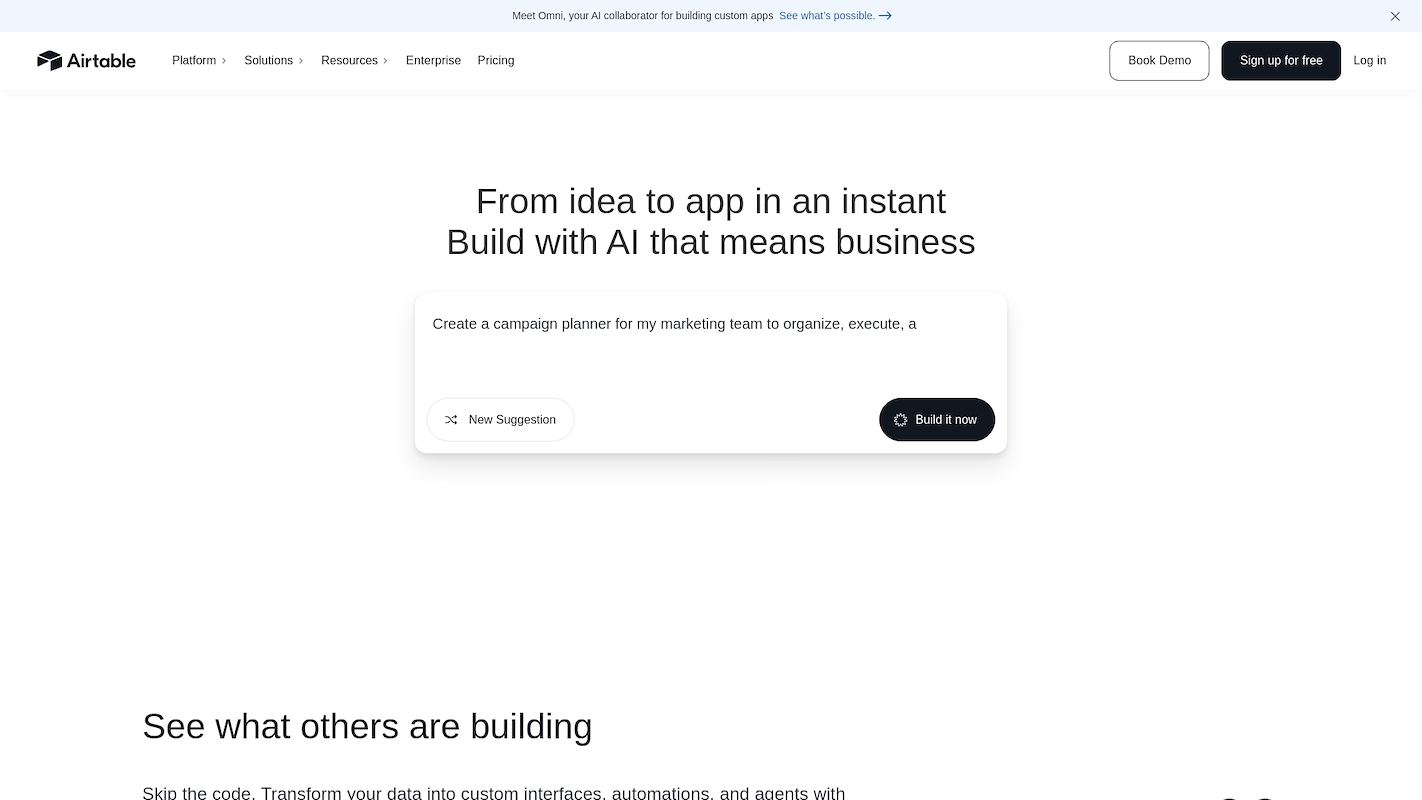
Airtable is a platform to build applications without code. It combines a relational database with an AI builder to create custom interfaces, automations, and workflows. Teams use it for various functions, from project management to sales CRM and pipeline management.
The platform supports large deployments and meets security standards like SOC2 and HIPAA. It allows organizations to create internal tools and consolidate data from different departments.
Airtable's Main Features
- The platform includes an AI app builder that generates applications from text prompts and uses drag-and-drop components.
- It deploys AI agents to perform actions across internal records and connected external tools.
- Its database engine, HyperDB, supports deployments with over 100 million records and tens of thousands of users.
- The system offers governance features, including admin roles, role-based access control, and compliance with ISO, SOC2, and HIPAA.
How Airtable Compares to Folk
Average Review score: 4.6/5 stars based on 2,998 G2 reviews.
- Airtable provides a no-code platform to build custom applications, which offers more flexibility than Folk's pre-defined CRM structure.
- It supports much larger operations by handling databases with over 100 million records, making it suitable for enterprise-level deployments where Folk may be limited.
- The platform includes an AI builder to create custom apps and automations, a more advanced capability compared to the standard features in Folk.
- This tool extends beyond CRM into project management and other business functions, while Folk focuses primarily on contact and relationship management.
Where Airtable Falls Short Compared to Folk
- Airtable's extensive customization options can create a steeper learning curve. Some users report that it requires more time to configure for CRM purposes compared to Folk's ready-made structure.
- The platform is a general-purpose database, so it lacks some built-in CRM functionalities that Folk offers natively. Teams must build features like advanced contact enrichment or email outreach sequences themselves.
- Its flexibility means the initial setup for a CRM can be more involved. Unlike Folk, which provides a pre-built system, users must design their own workflows and data structures from scratch.
Cost Analysis
Airtable's pricing starts with a free plan, followed by a "Team" tier at $20 per seat per month. Folk is more budget-friendly, with its "Standard" plan at $20 per user per year, reflecting its focused CRM functionality compared to Airtable's broader, more expensive platform.
2) HubSpot CRM
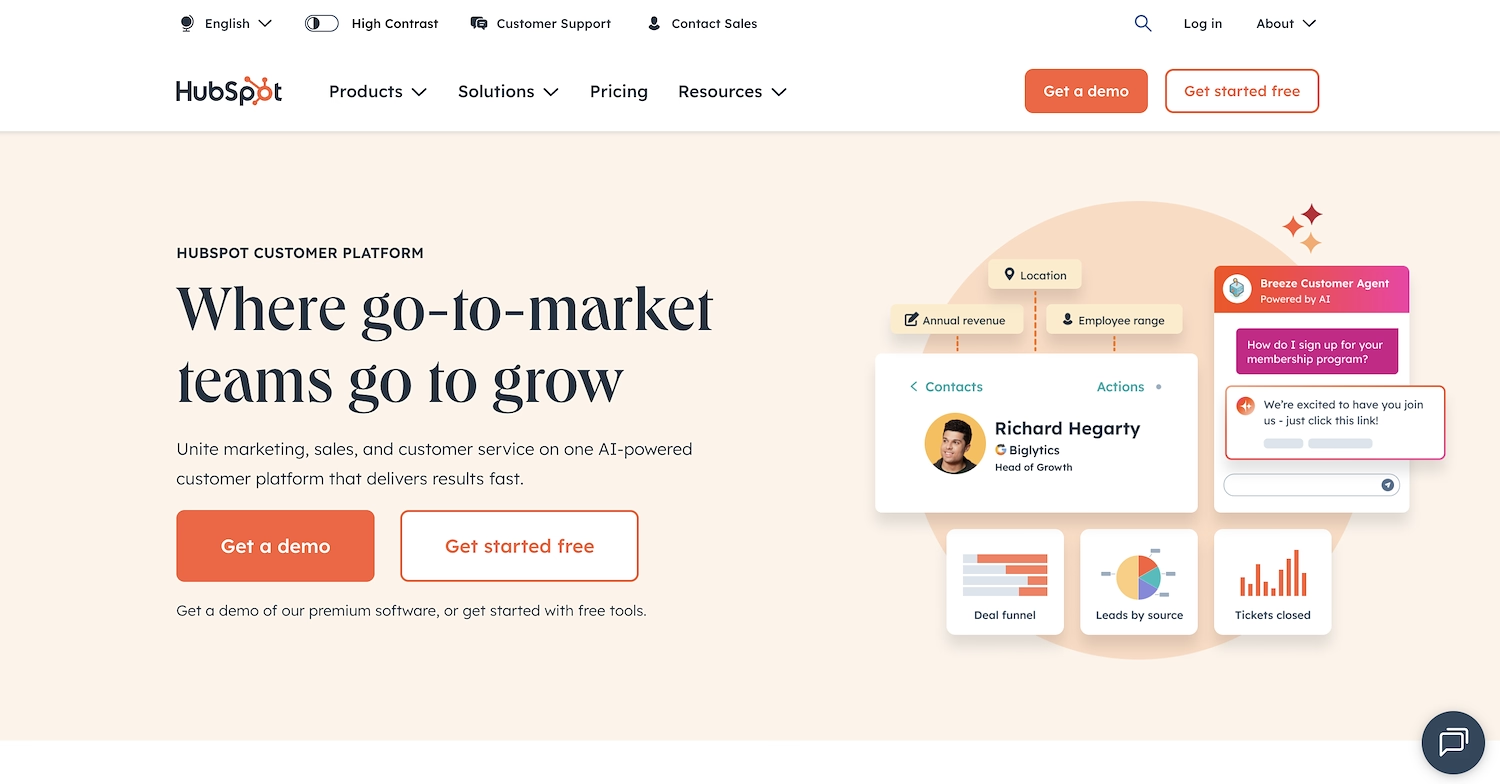
HubSpot CRM is a platform that connects data and tools for marketing, sales, content management, and customer service. It provides a central database for all customer interactions. Teams use the system to manage the sales pipeline, track leads, and align go-to-market activities from a single location.
HubSpot CRM's Main Features
- Connects data and tools for marketing, sales, content management, and customer service.
- Provides a central database for all customer interactions.
- Manages the sales pipeline, tracks leads, and aligns go-to-market activities from a single location.
How HubSpot CRM Compares to Folk
Average Review score: 4.4/5 stars based on 12,407 G2 reviews.
- HubSpot CRM provides an all-in-one platform that connects sales, marketing, and customer service. This is a broader scope than Folk, which focuses mainly on contact management.
- It offers more advanced automation for both sales and marketing tasks. These capabilities allow for more complex workflows compared to the simpler automation in Folk.
- The platform includes native customer support features, such as case management. This creates a more complete customer record than Folk, which would need other tools for support tickets.
- Its structure with separate hubs for different departments is designed for scaling businesses. This is different from Folk's design, which is better suited for smaller teams or individuals.
Where HubSpot CRM Falls Short Compared to Folk
- The platform's extensive features can create a steeper learning curve. Some users report that it takes more time to learn than Folk's simpler, more focused design.
- Its cost can be a factor for some teams. Access to more advanced sales and marketing features often requires subscriptions to higher-priced tiers, unlike Folk's more accessible pricing model.
- The all-in-one approach, which includes marketing and service hubs, can be more than what a team needs. For simple contact management, Folk offers a more targeted solution without the additional complexity.
Cost Analysis
HubSpot's Sales Hub Starter plan costs $20 per seat monthly, whereas Folk's Standard plan is $20 per user annually, making Folk more budget-friendly. While HubSpot offers a free CRM, its paid tiers are more expensive, reflecting its broader platform scope. For specifics, see HubSpot CRM's official website.
3) Pipedrive
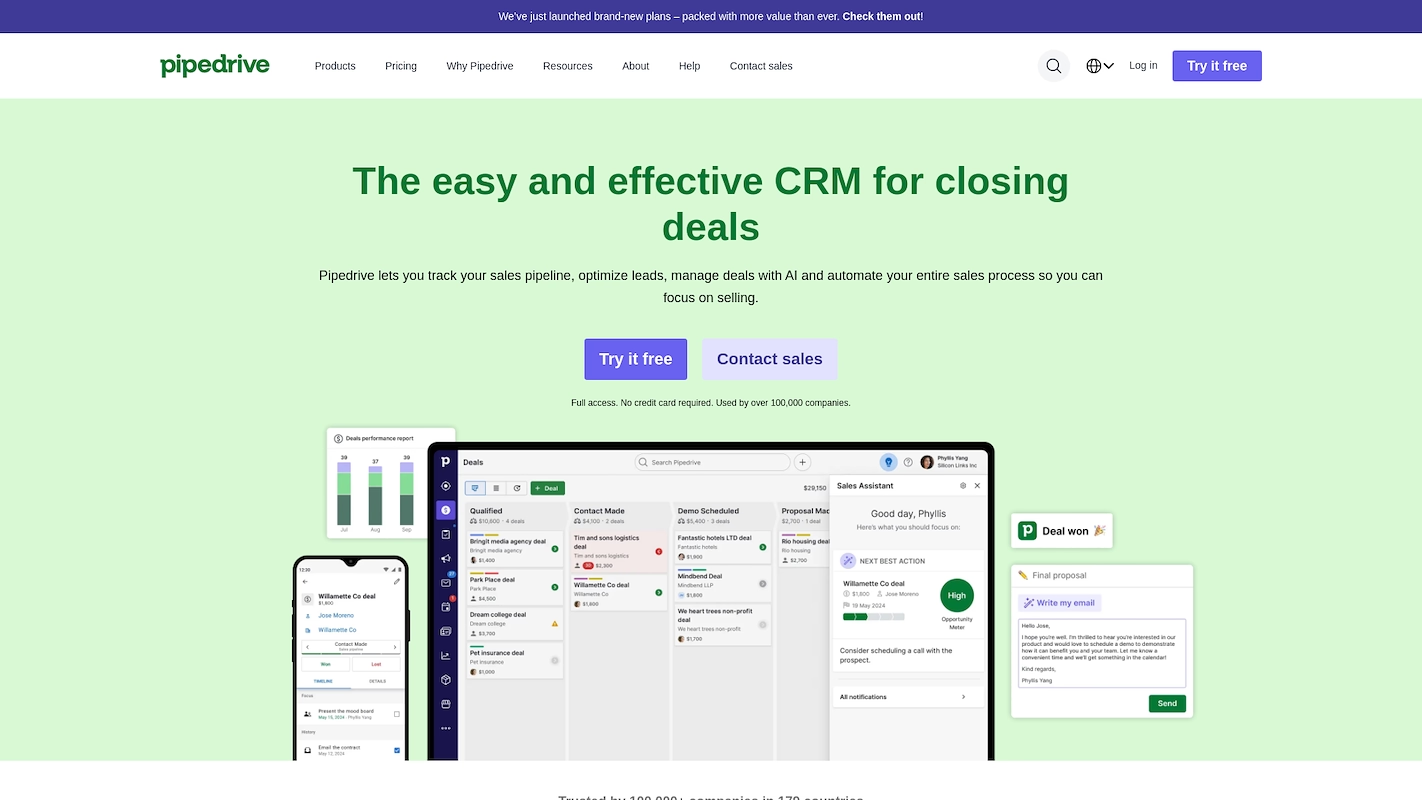
Pipedrive is a CRM platform for sales-driven teams to manage deals and track pipelines. It uses visual, kanban-style boards for deal management and offers workflow automation for repetitive tasks. The system also provides AI-powered sales guidance.
Organizations use it to centralize customer data and communications in one place. It automates lead follow-ups, generates sales forecasts, and syncs with email and calendars to help teams accelerate their response times.
Pipedrive's Main Features
- Offers visual, kanban-style pipelines with drag-and-drop functionality, custom stages, and custom fields.
- Includes an AI Sales Assistant that provides deal-win predictions and workflow automation templates for lead routing and follow-ups.
- Features two-way email sync with templates, integrated calendar scheduling, and automated multi-step email sequences.
How Pipedrive Compares To Folk
Average Review score: 4.3/5 stars based on 2,573 G2 reviews.
- Pipedrive provides a visual, drag-and-drop sales pipeline to track deals. This offers a more structured sales process compared to Folk's contact management focus.
- Its AI Sales Assistant gives predictions on deal success. This feature provides data-driven guidance that is not present in Folk.
- The tool includes specific sales automation for tasks like lead routing. This is more advanced than the general automation capabilities found in Folk.
- Pipedrive offers automated multi-step email sequences for sales outreach. This is a more specialized function compared to Folk's standard email integration.
Where Pipedrive Falls Short Compared to Folk
- Pipedrive separates companies and individual contacts, which some users find cumbersome. This approach differs from Folk, which provides a more unified view for straightforward relationship management.
- The platform's strong focus on sales means its features for other functions, like marketing, are basic. For teams that need a simple, all-around contact tool, Folk offers a more integrated experience without the sales-specific complexity.
- Some features that users may consider standard, such as email sync, are absent from Pipedrive's entry-level plan. Folk's standard plan often includes these core functions, which can make it a more cost-effective choice for smaller teams.
Cost Analysis
Pipedrive's entry-level plan is $24 per seat monthly, significantly more than Folk's standard plan at $20 per user annually. Folk is the more budget-friendly choice for basic contact management, while Pipedrive's higher cost is tied to its specialized sales pipeline features. For detailed pricing, visit Pipedrive's official website.
4) Zoho CRM
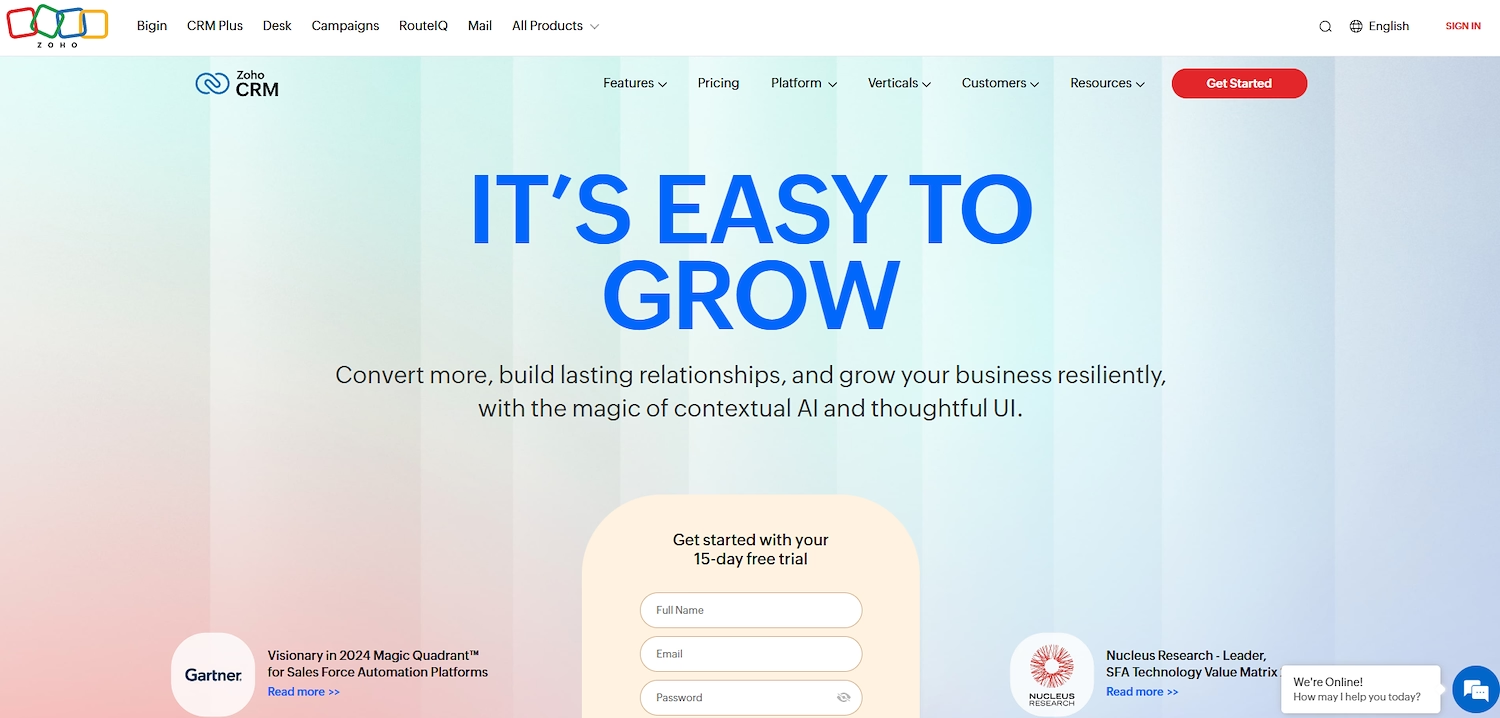
Zoho CRM is a platform that unifies sales, marketing, and customer support activities in a single repository. It allows companies to organize processes, policies, and people on one platform.
The system serves businesses of all sizes to convert leads, engage with customers, and grow revenue. It provides a connected set of tools to manage the entire customer journey.
Zoho CRM's Main Features
- The system uses Zia AI and Agentic AI for email rewriting, anomaly detection, and predictive insights.
- It offers dedicated collaborative work areas, called Teamspaces, so each department sees only the data it needs.
- Sales automation includes advanced workflows, cadences, and configure-price-quote (CPQ) functions.
- The Canvas Design Studio provides a drag-and-drop interface for UI customization and can generate layouts from images.
How Zoho CRM Compares To Folk
Average Review score: 4.1/5 stars based on 2,820 G2 reviews.
- Zoho CRM includes an AI assistant, Zia, for predictive insights and anomaly detection. This provides more advanced data analysis compared to the standard features in Folk.
- It provides advanced sales automation, including configure-price-quote (CPQ) functions. This is a specialized tool for complex sales processes that Folk does not offer.
- The platform offers separate work areas called Teamspaces. This allows different departments to see only relevant data, a more structured approach for larger teams than Folk's unified view.
- Its Canvas Design Studio allows for deep UI customization with a drag-and-drop editor. This offers more visual flexibility than Folk's pre-defined interface.
Where Zoho CRM Falls Short Compared to Folk
- Zoho CRM's comprehensive feature set can create a complex onboarding experience for new users. In contrast, Folk provides a more straightforward, ready-made structure that teams can adopt with less initial configuration.
- Some users report that the interface feels cluttered due to the number of features presented. This is different from Folk's minimalist design, which prioritizes ease of navigation over extensive functionality.
- The platform's mobile application may not include all the functions available on the desktop version. Teams that need full mobile capability might find Folk's focused approach offers a more consistent experience across devices.
Cost Analysis
Zoho CRM's Standard plan is $14 per user per month when billed annually, whereas Folk's Standard plan is $20 per user per year. This makes Folk a more budget-friendly choice for basic contact management. Zoho CRM's higher cost is tied to its comprehensive feature set, including advanced AI and automation tools.
5) Streak
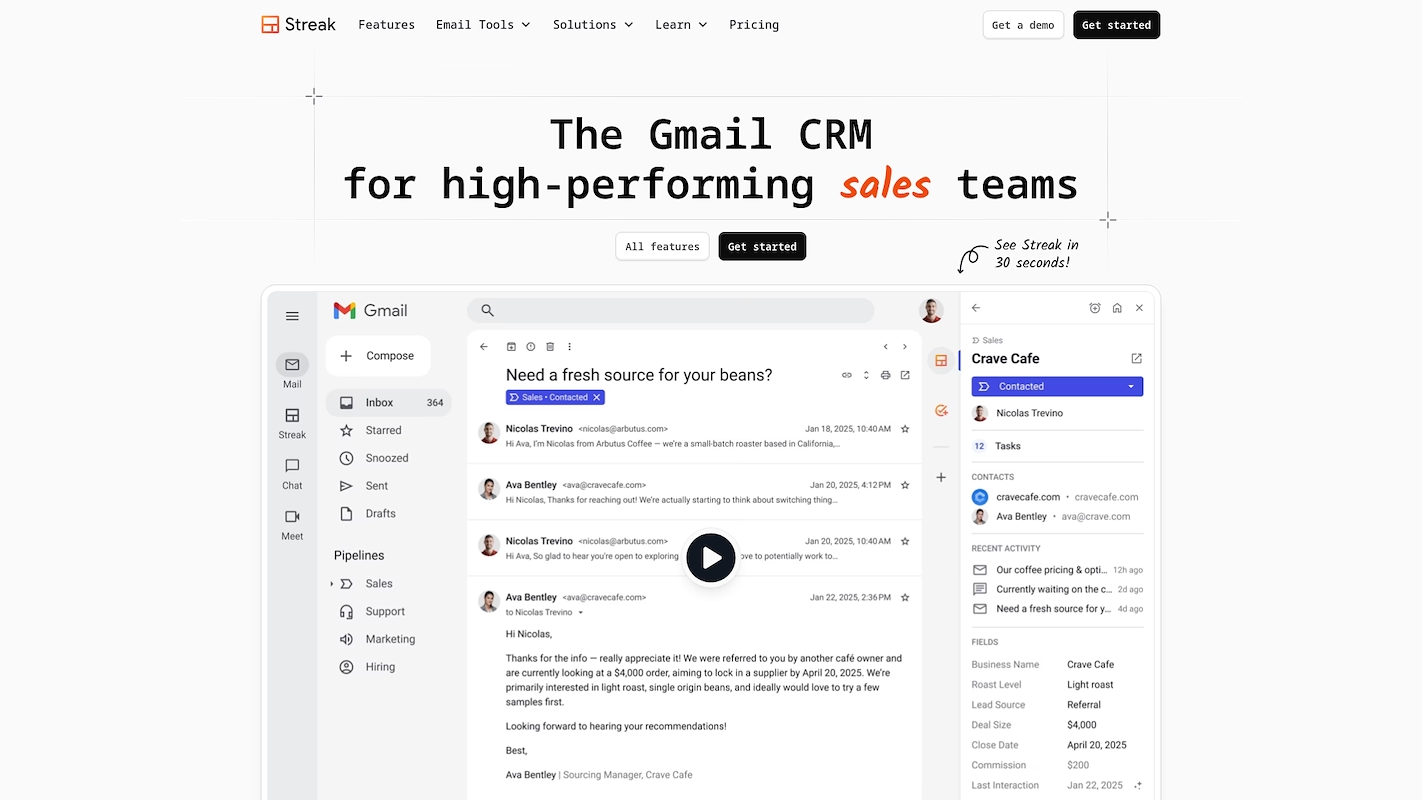
Streak is a CRM platform that operates entirely inside Gmail. It organizes inbox data into pipelines to manage workflows for sales, hiring, and business development. The system groups all emails for a specific contact or deal into a single view.
This creates a complete timeline of interactions within the inbox. Because of the direct integration, users can manage their CRM and communications without a need to switch between separate tools.
Streak's Main Features
- Embeds pipelines, deal records, and collaboration tools directly into the Gmail interface.
- Provides AI assistance to auto-fill fields from email content and calculate metrics like days in stage with "Magic Columns."
- Includes email power tools for tracking opens, sending mail merge sequences, and sharing or splitting email threads.
How Streak Compares To Folk
Average Review score: 4.5/5 stars based on 249 G2 reviews.
- Streak operates entirely inside Gmail, so users manage their CRM without leaving their inbox. This is different from Folk, which is a separate application that requires switching between tools.
- It provides advanced email features like open tracking and mail merge directly in the inbox. This offers more detailed communication management compared to Folk's standard email integration.
- The tool allows users to manage various workflows, such as sales, hiring, and projects, within Gmail. Folk, in comparison, focuses more specifically on contact and relationship management.
- Streak uses AI to automatically fill data from emails and calculate metrics. This provides a level of automation for data entry that is not a standard feature in Folk's simpler system.
Where Streak Falls Short Compared to Folk
- Streak works only within the Gmail ecosystem. This limits teams that use other email providers. Folk, as a standalone application, does not depend on a specific email client and offers more flexibility.
- Some users find its contact management less direct. Unlike Folk’s dedicated interface, managing contacts inside the Gmail inbox can feel less intuitive for complex organizational tasks.
- The platform’s reporting capabilities are sometimes considered basic. Teams that require detailed analytics might find it limited, whereas a dedicated CRM like Folk often provides more robust reporting tools.
Cost Analysis
Streak's Pro plan costs $49 per user monthly, while Folk's Standard plan is $20 per user annually. Folk is the more budget-friendly choice for basic contact management. Streak's higher cost is tied to its deep Gmail integration and email power tools.
Consider 11x for AI Sales Agents
If your team explores digital workers, 11x presents a different model. Its AI agents manage sales tasks like prospecting and lead qualification. For companies that want to automate parts of the sales process with autonomous agents, evaluate if 11x meets your operational goals.
With 11x, we use AI to run your sales playbook. Our agent Alice finds accounts, enriches data, and handles outreach, while Julian qualifies prospects and schedules meetings. The platform unifies everything from intent signals to email warmup, replacing multiple tools in a GTM stack.
Book a demo to see 11x in action.
6) Copper

Copper is a CRM platform for relationship management. It provides tools to organize contacts, manage sales processes, and track customer interactions from a central location.
Businesses use the system to create a unified record of client communications. This helps teams align their efforts and follow the entire customer journey.
Copper's Main Features
- Embeds directly into Gmail and Google Workspace to manage leads, track emails, and schedule tasks from the inbox.
- Duplicates closed deals into project boards to assign tasks and manage team collaboration.
- Automates personalized email series and triggers messages based on pipeline stage changes.
- Provides customizable, drag-and-drop pipelines with probability weighting and value sorting for deal tracking.
How Copper Compares To Folk
Average Review score: 4.5/5 stars based on 1,139 G2 reviews.
- Copper embeds directly into Google Workspace, so users manage CRM tasks from their Gmail inbox. This contrasts with Folk, which is a separate application that requires switching between tools.
- It converts closed deals into project boards for task management. This provides a post-sale workflow that is different from Folk's primary focus on contact and relationship management.
- The platform automates email sequences based on pipeline stage changes. This offers more specific sales automation than the standard email integration found in Folk.
- This tool provides customizable drag-and-drop pipelines with deal value sorting. This creates a more visual and structured sales process compared to Folk's flexible contact grouping system.
Where Copper Falls Short Compared to Folk
- Copper's exclusive integration with Google Workspace limits teams that use other email providers. Folk is a standalone application, so it offers more flexibility because it does not depend on a specific email platform.
- The tool is built around sales pipelines, which some users find rigid for general relationship management. In contrast, Folk provides a more adaptable system for organizing contacts that is not tied to a sales process.
- Its pricing is higher when compared to Folk. For teams that do not require deep Google integration or post-sale project management, Folk offers a more budget-friendly solution for core contact management tasks.
Cost Analysis
Copper's Basic plan is priced at $23 per user per month with annual billing, while Folk's Standard plan costs $20 per user per year. This makes Folk a more budget-friendly option for core contact management. Copper's higher price reflects its deep Google Workspace integration and specialized sales features.
7) Monday Sales CRM
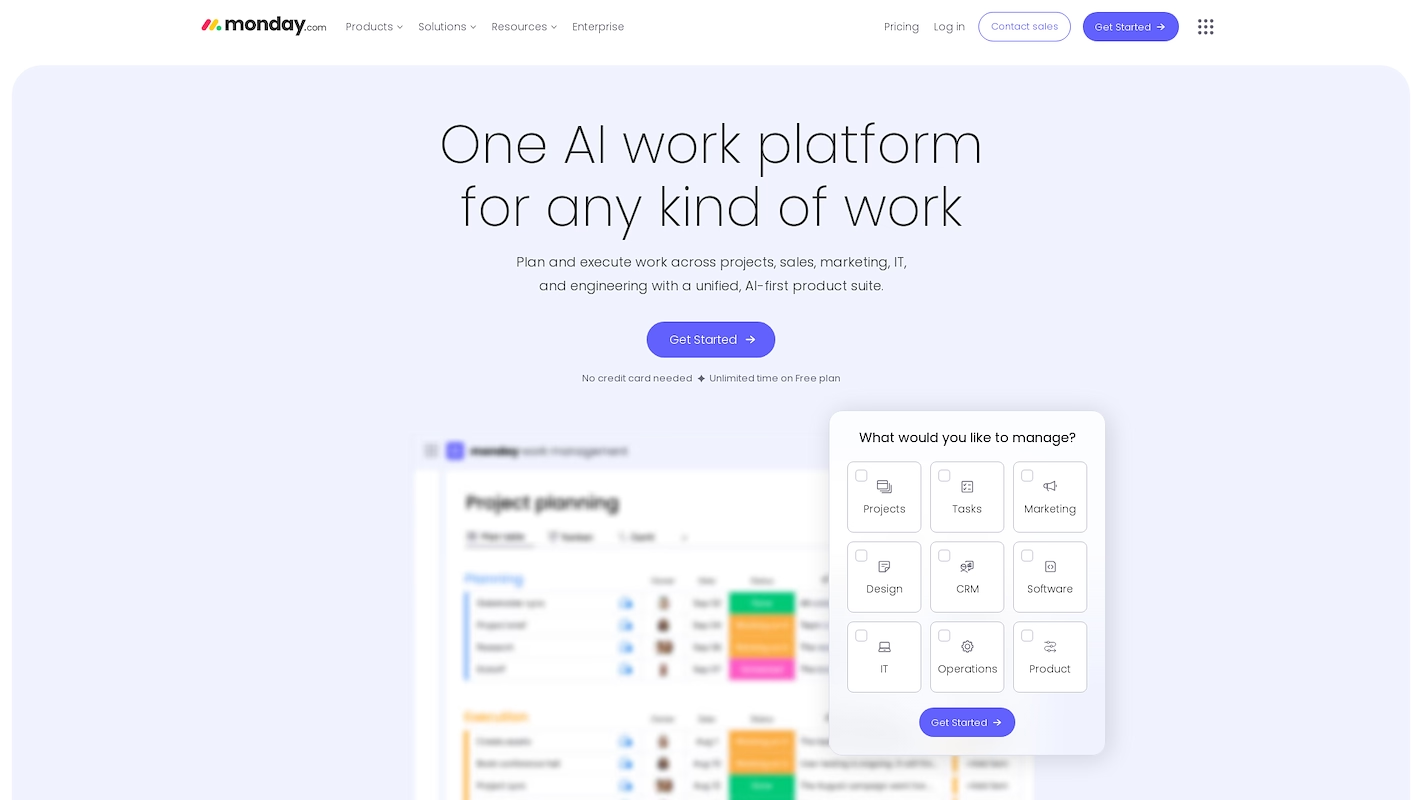
Monday Sales CRM is a customizable platform built to manage the entire sales cycle. It centralizes contacts, leads, and deals in one location. Teams use it to automate sales processes and get an overview of performance through dashboards.
The system also handles post-sales activities like client projects and account management. This design connects sales with other business functions and supports flexible workflows beyond the initial deal.
Monday Sales CRM's Main Features
- The platform includes AI assistance for drafting emails, summarizing call notes, and generating tasks. It also has a plain-language formula builder for creating complex reports.
- It offers customizable pipelines with drag-and-drop stages and unlimited columns, which can be configured with low-code or no-code tools.
- The system provides one-click automation recipes to assign leads, set reminders, and send notifications when an email is opened.
- It includes end-to-end sales modules that manage post-sales activities, such as client project tracking, directly within the CRM.
How Monday Sales CRM Compares To Folk
Average Review score: 4.6/5 stars based on 973 G2 reviews.
- Monday Sales CRM includes AI assistance for drafting emails and generating tasks, which provides a different level of automation for daily activities compared to Folk's more manual approach.
- It manages post-sales activities like client projects directly within the CRM. This connects the sales cycle to project delivery, a function not native to Folk's contact-focused system.
- The platform offers extensive customization with no-code tools for building specific sales pipelines. This gives more flexibility than the simpler, pre-defined structure of Folk.
- This tool provides one-click automation recipes for tasks like lead assignment and reminders. This offers a more guided approach to workflow automation than the general features found in Folk.
Where Monday Sales CRM Falls Short Compared to Folk
- Monday Sales CRM's extensive customization options can create a steep learning curve. Some users report that the initial setup is more involved compared to Folk's simple, ready-to-use structure that requires less configuration.
- The platform's broad scope, which includes post-sales management, can be more than what some teams need. For basic relationship tracking, Folk provides a more focused tool without the additional complexity of a full sales cycle platform.
- Some users find that the interface can feel cluttered, which makes certain tasks feel cumbersome. This is different from Folk's minimalist design, which prioritizes a straightforward user experience for contact management.
Cost Analysis
Monday Sales CRM's Standard plan is priced at $17 per user per month, while Folk's Standard plan costs $20 per user annually. This makes Folk a more budget-friendly choice for core contact management. Monday's higher price reflects its extensive customization and post-sales features.
8) Freshsales
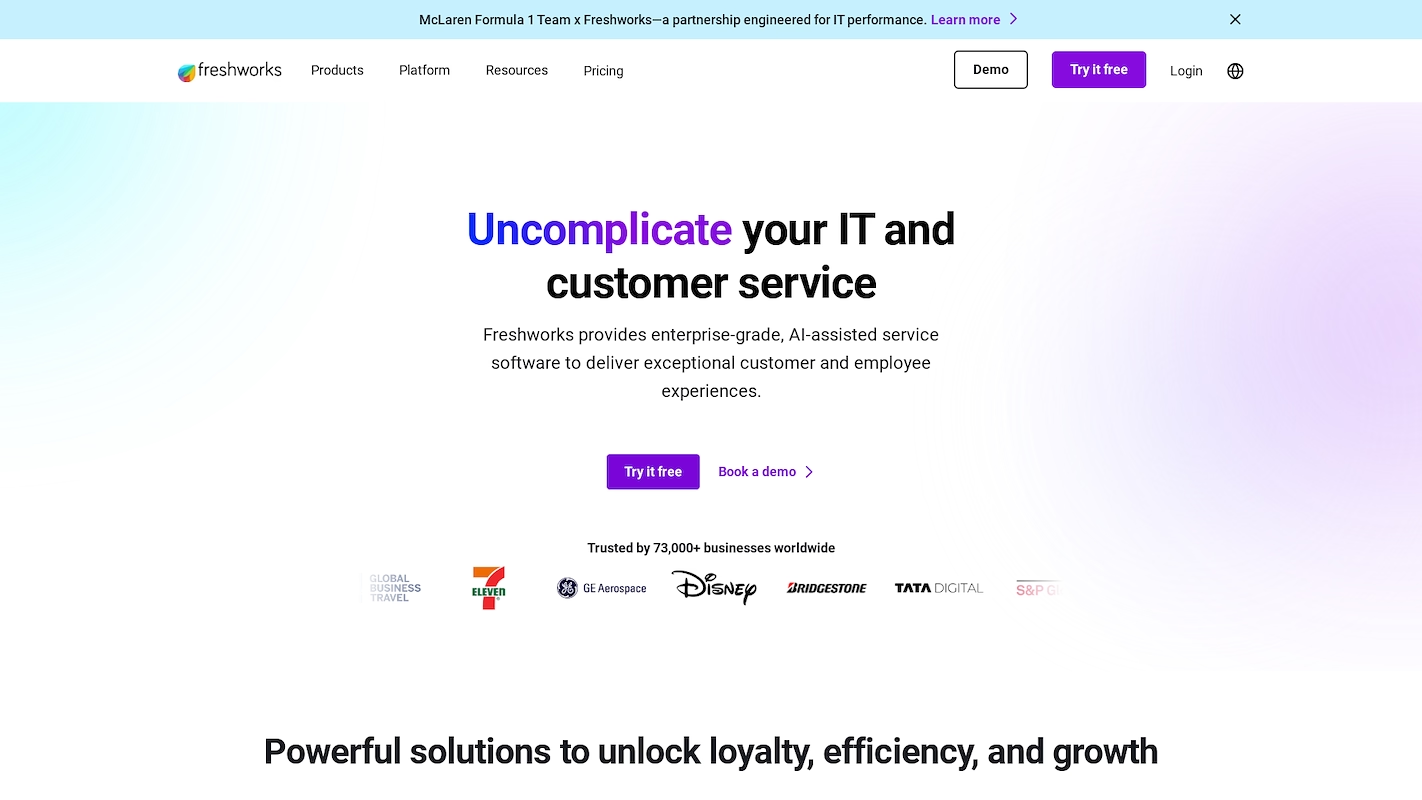
Freshsales is a sales CRM that helps businesses manage leads, customer relationships, and sales pipelines. The platform provides a unified view of customer interactions across email, phone, and chat.
Teams use it to automate sales tasks, track deals, and get insights from sales data. The system gives context for each conversation to help shorten the sales cycle.
Freshsales's Main Features
- Offers sales force automation for opportunity, pipeline, and task management.
- Includes marketing automation tools for email marketing and campaign management.
- Provides customer support functions, including case management and a knowledge base.
- Delivers reporting and analytics with dashboards and forecasting capabilities.
How Freshsales Compares To Folk
Average Review score: 4.5/5 stars based on 1,224 G2 reviews.
- Freshsales includes a built-in AI assistant, Freddy AI, which provides deal insights and helps draft emails. This offers a different level of support compared to Folk, which lacks a native AI sales assistant.
- The platform unifies sales, marketing, and customer support functions like case management. This is different from Folk, which centers on contact management and needs integrations for broader customer service tasks.
- It provides built-in phone and chat functions directly within the platform. This contrasts with Folk, which relies on integrations for communication channels beyond its standard email features.
- The tool includes marketing automation for managing email campaigns and leads. This is a more specialized function than the general contact organization and simple outreach found in Folk.
Where Freshsales Falls Short Compared to Folk
- Freshsales combines sales, marketing, and support, which can create a steeper learning curve. In contrast, Folk's focused design on contact management allows for a more straightforward adoption process for teams with simpler needs.
- The platform's all-in-one nature means it includes features that may be unnecessary for basic relationship management. Folk provides a more targeted solution, which can be a better fit for teams that do not need extensive sales or marketing tools.
- Some users find the interface less intuitive due to its many features. Folk's minimalist design, on the other hand, offers a cleaner user experience that prioritizes simple navigation and contact organization over broad functionality.
Cost Analysis
Freshsales' Growth plan starts at $9 per user per month, while Folk's Standard plan is priced at $20 per user per year. This makes Folk a more budget-friendly option for teams needing core contact management. Freshsales' higher price reflects its all-in-one platform, which includes sales, marketing, and support features.
9) Nimble
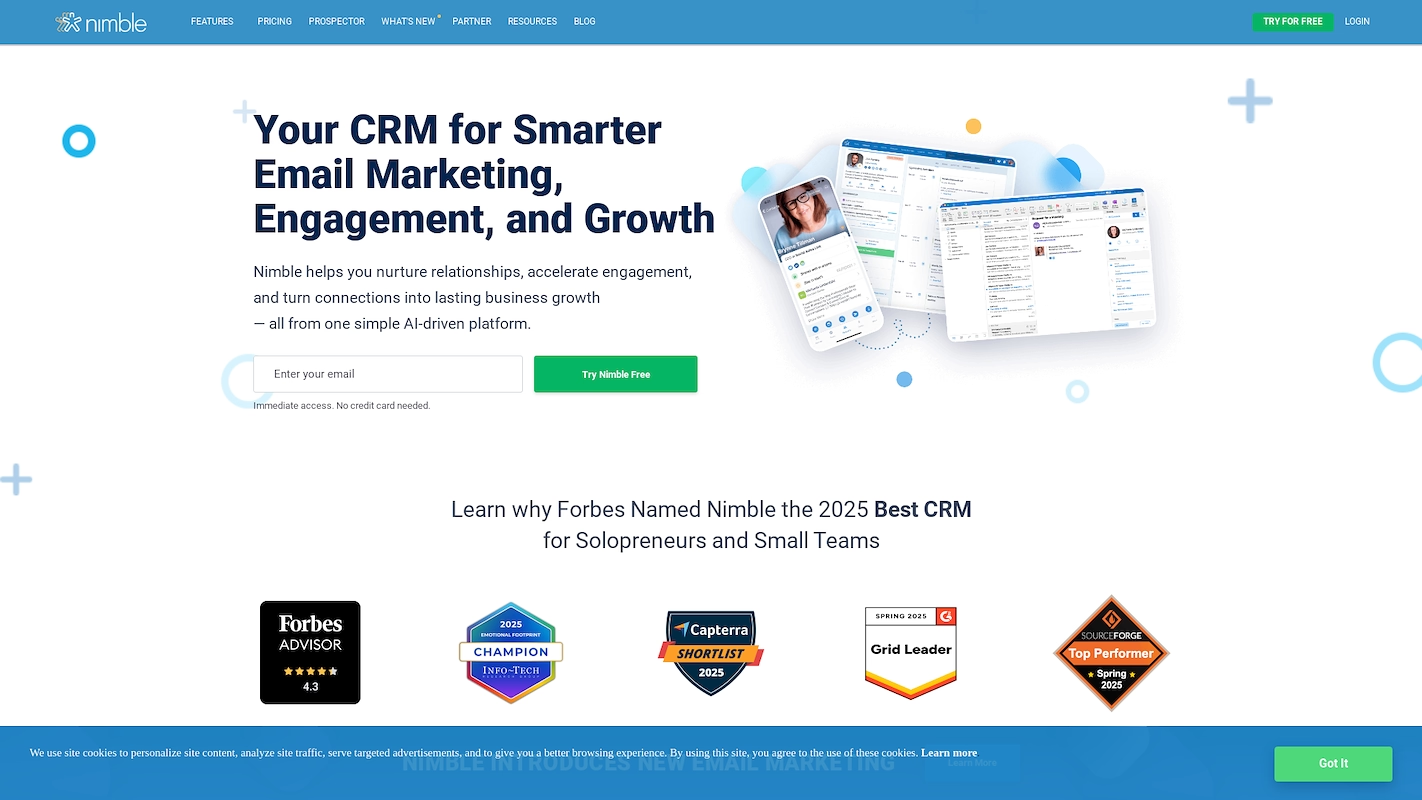
Nimble is a CRM platform that unifies contacts and business relationships. It centralizes customer information and interaction history from multiple sources into a single database.
Teams use the system to organize contacts, track conversations, and oversee sales processes. This approach creates a unified record of customer data for all team members.
Nimble's Main Features
- Integrates with social networks and includes social collaboration features.
- Provides a customer support portal and a knowledge base.
- Includes sales force automation for opportunity, pipeline, and task management.
- Offers marketing automation tools for email marketing and campaign management.
How Nimble Compares To Folk
Average Review score: 4.5/5 stars based on 1,102 G2 reviews.
- Nimble integrates with social networks to automatically populate contact profiles with social media data. This provides a richer contact view compared to Folk's standard contact management.
- It includes a customer support portal and a knowledge base. This allows teams to manage support issues within the CRM, a function that requires separate tools with Folk.
- The platform offers marketing automation tools for managing email campaigns. This is a more specialized function than the basic email integration and outreach features found in Folk.
- This tool provides sales force automation for managing opportunities and pipelines. This offers a more structured sales process, while Folk focuses on flexible contact grouping.
Where Nimble Falls Short Compared to Folk
- Nimble's design focuses on sales features, which can be unnecessary for users who need general relationship tools. In comparison, Folk offers a more flexible platform for various contact organization tasks.
- Some users report the platform's automation can incorrectly associate emails with deals. This differs from Folk, where users have more direct control over how they organize contact information.
- The mass email tool may lack some advanced features, and some users note occasional issues like duplicate messages. Folk provides a simple system for email outreach that can be more reliable for basic tasks.
Cost Analysis
Nimble's annual plan is priced at $24.90 per user, while Folk's Standard plan is $20 per user annually. Folk is the more budget-friendly option, though Nimble's slightly higher cost is tied to its social media integration and sales automation features.
10) Insightly CRM
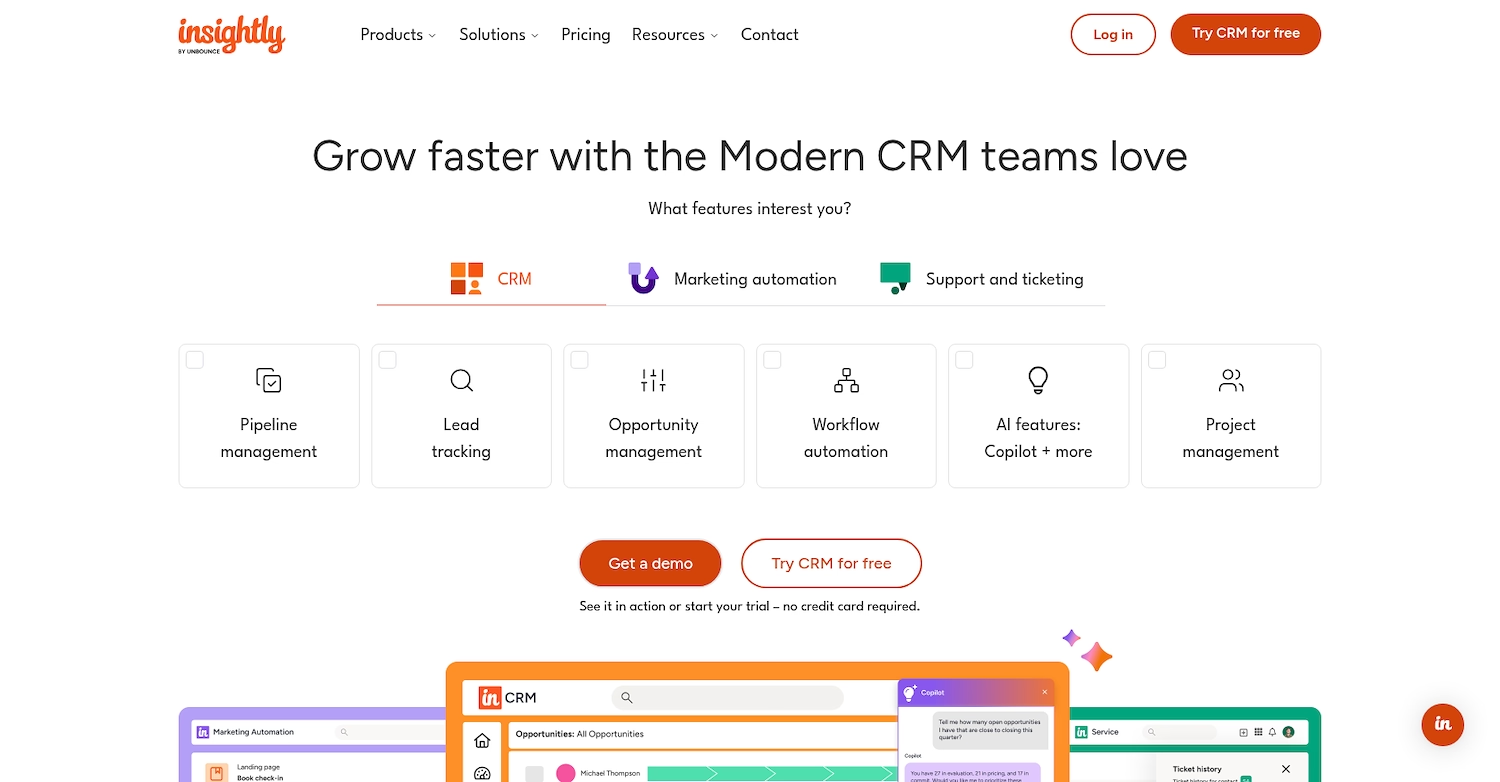
Insightly CRM is a platform that connects marketing, sales, and service departments. It gives teams a shared view of customer data to align their work.
Companies use the system to manage leads, track projects after a sale, and maintain a complete history of customer interactions in one place.
Insightly CRM's Main Features
- Offers sales force automation for opportunity, pipeline, and task management.
- Includes marketing automation tools for email marketing and lead management.
- Provides customer support functions, including case management, a support portal, and a knowledge base.
- Features mobile user support for managing data on the go.
How Insightly CRM Compares To Folk
Average Review score: 4.2/5 stars based on 922 G2 reviews.
- Insightly CRM provides a customer support portal and a knowledge base. This allows teams to manage service issues directly, a function not available in Folk, which focuses on pre-sale contact management.
- It offers marketing automation tools to manage email campaigns and leads. This is a more specialized function compared to the general outreach features found in Folk.
- The platform includes features for products, price books, and quotes (PPQ). This supports complex sales processes, a capability not present in Folk's simpler system.
- Its mobile application lets users scan business cards to upload contact information. This provides a field sales feature that is distinct from Folk's standard mobile functions.
Where Insightly CRM Falls Short Compared to Folk
- Insightly CRM has many features, which can make the initial setup complex. Some users find it has a steeper learning curve than Folk's simple, ready-to-use design.
- The platform limits mass emails to 50 contacts at a time. This can be a hurdle for larger outreach efforts, where Folk's flexible system may be a better fit.
- Some users report occasional bugs and data sync delays. Folk's simpler structure might provide a more stable experience for teams focused on core contact management.
Cost Analysis
Insightly CRM's Plus plan is priced at $29 per user per month with annual billing, whereas Folk's Standard plan costs $20 per user per year. This makes Folk a more budget-friendly option for teams focused on core contact management. Insightly's higher price reflects its unified platform, which includes sales, marketing, and project management features.
Which Folk Alternative Should You Choose?
Choosing the right Folk alternative depends on your team's specific needs, budget, and existing tech stack. This guide analyzed ten options, comparing their features and costs to help you create a shortlist for evaluation.
If your goal is to automate sales functions, 11x offers a different approach. Its AI agents handle tasks like prospecting, outreach, and lead qualification, which can replace several tools in your GTM stack and consolidate operations into a single platform.


